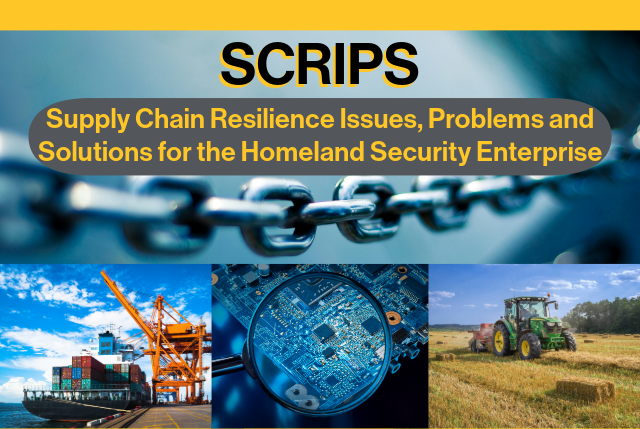On October 1-2, 2024, CBTS will be collaborating with the Department of Homeland Security (DHS) Supply Chain Resilience Center (SCRC), the Center for Accelerating Operational Efficiency (CAOE) at Arizona State University, and the Command, Control, and Interoperability Center for Advanced Data Analysis (CCICADA) at Rutgers University to conduct a supply chain resilience workshop. Known by the acronym SCRIPS, this two-day workshop will focus on supply chain resilience in three critical sectors: Agriculture/Food, Semiconductor Manufacturing, and Maritime/Port Operations.
Supply chain resilience has become an increasingly critical area of academic research and business continuity practices, especially considering recent and ongoing global disruptions. The purpose of the workshop is to foster research that examines the importance of resilience in the context of different sectors and helps industry and government organizations to better anticipate, prepare for, and recover from disruptions. Through this effort we hope to strengthen our understanding of supply chain resilience issues and provide insights on how to develop more robust and adaptable supply chains across a variety of sectors.
Goals of the workshop
While attendance at the workshop is by invitation only, based on white paper submissions, the objectives of the workshop are to 1) Bring together leaders from academia, government, and industry; 2) Identify research needs to ensure the resilience of critical supply chains; 3) Develop prioritized research problem statements and solution approaches; and 4) Inform the development of a Request For Research Proposals to be distributed in Spring 2025. As such, this workshop will contribute to a broader set of initiatives to address supply chain resilience issues. It also builds upon previous efforts, including the establishment of the SCRC in November 2023. This collaborative workshop represents a major step in developing a comprehensive research agenda to enhance supply chain resilience in critical sectors, with potentially far-reaching implications for homeland and economic security.

